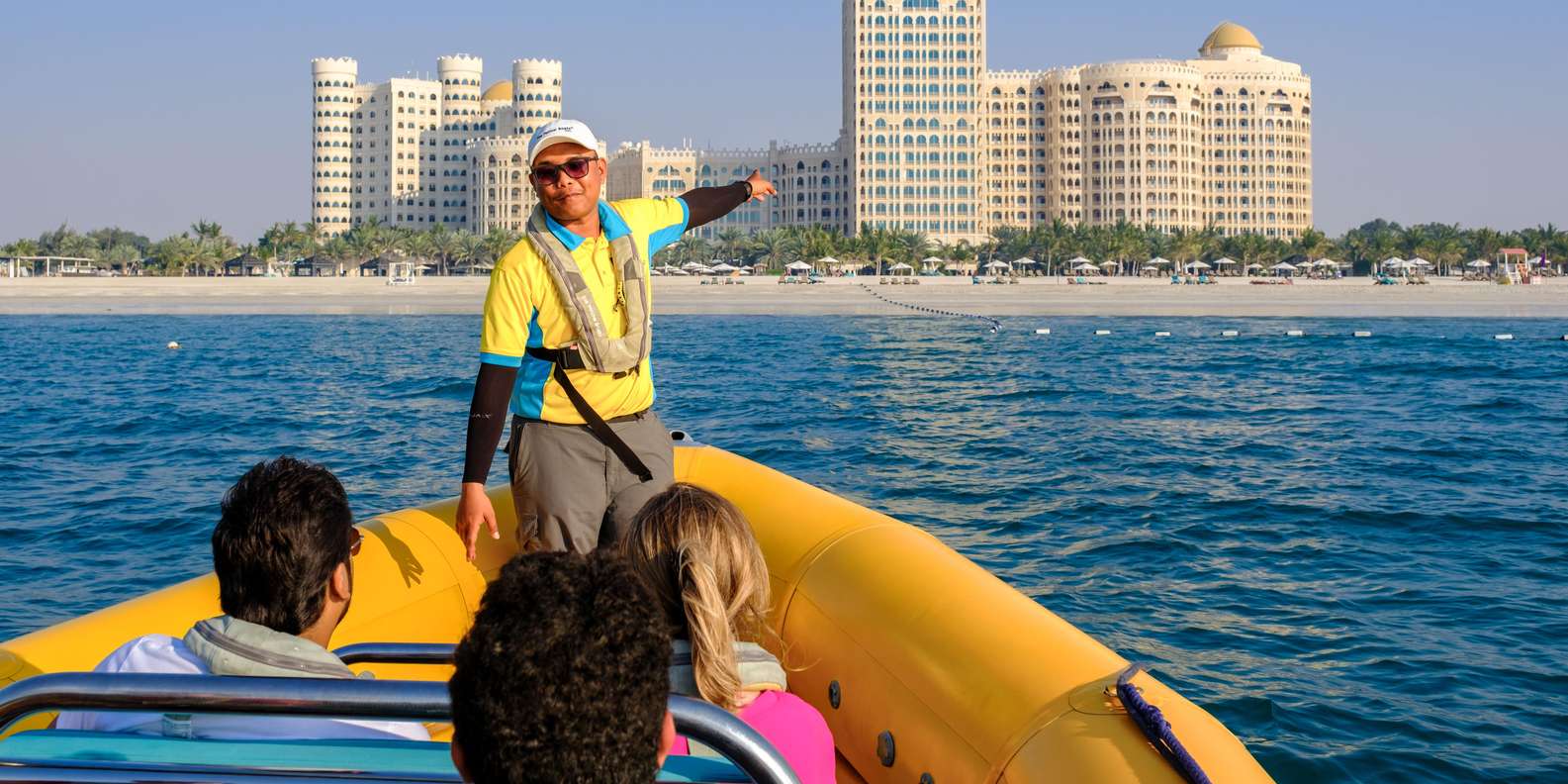
Adviсes • 17 October, 2025
How to choose the best season for a holiday in the UAE
Low season (May – September)
Journey to the United Arab Emirates with Centrum Air is an opportunity to immerse yourself in the atmosphere of Eastern luxury, see impressive achievements of modern architecture, and enjoy the comfort that millions of tourists value. The airline operates flights to two airports at once – Dubai and Al–Maktum, which gives travelers greater flexibility in choosing routes and convenience in planning vacation in different emirates.
But for the trip to leave exceptionally pleasant impressions, it is important to choose the right time for it. The UAE climate remains predictable and favorable for tourism for most of the year. There is almost no rain here, and the sun shines for more than 350 days a year.
Due to stable weather conditions, the country is divided into two main holidays – high season (October – April) and low season (May – September) . Temperature, humidity, and even wind intensity vary depending on the month. This affects how comfortable a beach vacation, walking around the city, or safari in the desert will be. To make a conscious choice, it's worth carefully examining the characteristics of each season and understanding how one season differs from another.
High season (October – April)
From October to April, the most comfortable time for travel comes in the Emirates. The air warms up to +25°C – +30°C, the water in the Persian Gulf remains warm – around +24°C – +27°C, and the nights become cool and pleasant for walks. This time is ideal for those who want to combine beach recreation with a rich excursion program.
Thanks to the mild climate, you can plan trips to the desert, walks through Sharjah's historical quarters, visit Abu Dhabi's architectural landmarks, or safari on the dunes. Local parks, coastal areas, and shopping centers in Dubai are fully operational, offering tourists maximum comfort.
High season benefits:
– moderate air and water temperature
suitable for all ages;
– the opportunity to spend whole days outdoors;
– ideal conditions for excursions, safari, diving, and walks along the shores;
– the diversity of events and festivals held during this period;
– a high level of service, a wide selection of excursions and entertainment.
The peak season is also the time when the country receives the most tourists. Therefore, it's worth being prepared for hotel and air ticket prices to be noticeably higher than in summer. The closer the New Year and Christmas, the more expensive the accommodation becomes. Booked tours allow you to save significantly.
Despite the fact that in winter the influx of tourists reaches its peak, the atmosphere remains comfortable. Hotels, restaurants, and beaches are operating smoothly, and the tourism infrastructure is well–prepared. If the purpose of the trip is to see the country in all its brightness and activity, then this is the best period for travel.
Low season (May – September)

With the arrival of May, the air temperature begins to rise rapidly, and the humidity increases in coastal areas. In June and July, the thermometer reading often exceeds +45°C, especially in the middle of the day. For unprepared tourists, such heat may seem extreme, however, even this season has its advantages and can be comfortable with proper organization of recreation.
During this period, most travelers prefer to spend time indoors with air conditioners. Large shopping centers, oceanariums, museums, and hotels provide all the conditions for relaxing without the need to be under the sun.
Low season benefits:
– significant reduction in prices for
accommodation, air travel, and excursions;
– fewer tourists, a calm atmosphere on beaches and in hotels;
– attractive promotions and offers from hotels and airlines;
– the opportunity to enjoy solitude and a measured rhythm of rest;
– a warm sea where you can swim even in the dead of night.
The summer months are often chosen by those who prefer silence and are not afraid of the heat. Travel is especially beneficial for families with children or those planning to stay for a long time – renting accommodation and food are also cheaper.
To prevent heat from interfering with rest, it's worth planning activities in the morning or closer to evening. It's better to stay indoors during the day. It is recommended to choose hotels with closed beach passages, air–conditioned swimming pools, and good recreation areas.
Inter–seasonal and transitional months
May and September can be called transitional periods. These months often go unnoticed, although they provide an opportunity to enjoy relaxing in comfortable conditions without an influx of tourists.
In May, the temperature is already approaching summer levels, but the heat is not yet reaching its maximum. The sea is warm, the beaches are not overcrowded, and the prices remain moderate. September is the time when the heat gradually subsides and evenings become pleasant for walks.
The off–season is ideal for those seeking a balance between comfort and benefit. Hotels offer flexible tariffs, and the tourism infrastructure is operating normally. Beaches aren't overcrowded, and excursion programs are becoming more personalized.
Travelers arriving during this period note the calm atmosphere and the opportunity to rest without hassle. This is a good time for those who value silence but also want to avoid extreme temperatures.
Prices and tourist flow by season

Seasonality in the UAE directly affects prices and the occupancy of resorts. During the peak season (from November to March), hotels operate at maximum occupancy, and room costs can increase by one and a half to two times. This is due not only to the weather, but also to the numerous festivals and events that take place during this period.
In the summer months, on the contrary, there is a decrease in prices for all categories of services. Some five–star hotels offer accommodation at the price of three–star hotels, and travel agencies offer discounts of up to 40%.
Seasonal pricing features:
– in November–February – the highest
tariffs, especially on the coast of Dubai and Abu Dhabi;
– in April and October – moderate prices with comfortable weather conditions;
– from June to August – minimum prices, discounts on packages and
accommodation;
– during holidays (New Year, Ramadan, Formula 1) there may be short–term price
increases.
Knowing this dynamic, you can plan your trip in a way that maximizes the benefits. Many experienced travelers book vacations in the "closing" months – October and April, when weather conditions are comfortable and prices haven't yet reached their peak.
Event Season
One of the factors influencing the choice of travel time is the richness of the event calendar. Many cultural, sports, and entertainment events are held in the UAE, bringing in guests from all over the world.
The largest number of holidays falls on winter and early spring. During this period, life in the Emirates is bustling: concerts, exhibitions, fashion shows, and world–class sports competitions take place.
Major annual events:
– Dubai Shopping Festival (January–February)
– a large–scale shopping, concert,
and fireworks festival;
– Dubai Food Festival (March) – a
gastronomy festival where you can taste the cuisine of different countries;
– Formula 1 in Abu Dhabi (November) – a significant sporting event with thousands
of spectators;
– UAE National Day (December 2) –
large–scale celebrations and street parades;
– Dubai Summer Surprises (July–August) – a summer festival of discounts, concerts,
and entertainment for children.
After the festival period, the country takes a short "breath" – in the summer, life transitions to premises, and already in October, a series of new cultural events begins.
It's also worth considering that Ramadan is a holy month for Muslims. During this time, there are restrictions on food and entertainment during the day, but in the evenings, life comes alive, special iftar dinners and thematic fairs open.
How to choose the best season for your goals

Every traveler comes to the Emirates with their own tasks: some seeking peaceful recreation, some shopping and events, and others the opportunity to see the country without hassle. To choose the ideal time, it's important to determine priorities in advance.
Recommendations for rest type:
· For beach relaxation. October – April: gentle sun, comfortable temperature, calm sea;
· For excursions and walks. November–March: cool air, ideal conditions for sightseeing;
· For shopping. January and February: Sale season, festivals, favorable prices;
· For family recreation. March, April, November: moderate heat, children's programs, family hotel promotions;
· For an economical vacation. Summer: discounts, quiet and peace at resorts.
After defining the goal, it becomes easier to choose the date of the trip. If the main goal is beaches, it's worth giving preference to winter. To save – summer. For cultural events – autumn.
This approach will help you plan your vacation without rushing, avoid unexpected situations, and get maximum enjoyment from the journey. The best season is the one that suits you best. And if you approach planning consciously, the Emirates will give you impressions that will be remembered for a long time, regardless of the season.